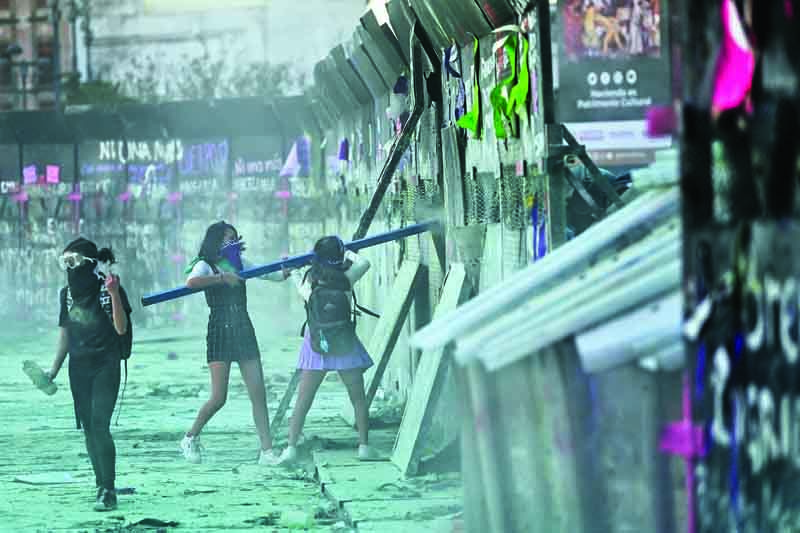 MEXICO CITY: Women clash with the police, behind a fence in front of the National Palace, as they protest during a demonstration to commemorate the International Women's Day in Mexico City, on Monday.-AFP
MEXICO CITY: Women clash with the police, behind a fence in front of the National Palace, as they protest during a demonstration to commemorate the International Women's Day in Mexico City, on Monday.-AFP
MEXICO CITY: Tens of thousands on Monday defied coronavirus restrictions, gathering worldwide on International Women's Day to denounce gender violence and inequalities. Women took to the streets in peaceful democracies and in countries gripped by conflict, though in far smaller numbers than last year, when the full force of the Covid-19 pandemic had yet to hit the world.
Thousands marched in Mexico City, bringing with them photos with the names of alleged rapists, murderers and harassers of women. "Together we are the fire, burn everything," said one banner in the crowd, some of whom angrily kicked at a wooden fence around the Monument to the Revolution. "My daughter was raped. I am grateful that she is alive," 45-year-old Leticia Resendiz told AFP.
Thousands of women also marched in Buenos Aires, Argentina, which has seen a wave of femicide that has claimed on average one life per day so far this year. "We want to be free, alive and without fear," said posters carried by the demonstrators. Clashes broke out in Chile, as police used water cannon and tear gas to disperse thousands of protesters who painted the slogan "They are killing us" on the esplanade next to Plaza Italia, in central Santiago.
More than 100 activists wearing purple to symbolize women's struggle gathered outside the prosecutor's office in Honduras to demand justice for nurse Keyla Martinez, 26, who died in police custody last month. "Here, the life of the woman is worth nothing," said Maria Julia Avila, 49. Honduras' human rights watchdog says 4,769 women were murdered in the country between 2010 and 2020.
'We won't be silent'
In France, where one woman is killed every three days by their partner or ex-partner, according to 2019 government figures, tens of thousands marched in major cities to call for stronger police action against femicide. In Turkey, several hundred Muslim Uighur women protested near China's walled-off consulate in Istanbul, calling for the closure of mass-incarceration camps in the Xinjiang region.
"Rape is a crime against humanity," read one poster, referring to a BBC report alleging systemic rape and forced sterilization in the camps-charges China denies. Thousands marched elsewhere in Istanbul and Ankara, many of them angered by a recent viral video purporting to show an attack on a woman by her ex-husband in front of their five-year-old child in the country's north. "We're not scared, we won't be silent and we won't bow down," some posters read.
Hundreds gathered in the Algerian capital to protest against a family code that governs family and property relations, and which many view as demeaning to women. Nearly 2,000 people gathered in Kiev to demand that Ukraine ratify the Istanbul Convention against domestic abuse.
Made worse by COVID
In Spain, Madrid banned gatherings over the virus, but a few dozen women gathered nevertheless. Several thousand demonstrators massed in Barcelona for a socially distanced march, wearing purple masks and carrying posters with slogans such as: "No means no" and "The real pandemic is machismo." "The pandemic has made the differences clearer. Who's been left to look after everyone at home? Who's had problems going back to work?" asked Alys Samson, 29.
Three of the world's most influential female leaders-US Vice President Kamala Harris, New Zealand's Prime Minister Jacinda Ardern and EU chief Ursula von der Leyen-told the European Parliament the economic and political fallout from the pandemic has sharpened the challenges facing women worldwide. "COVID-19 has threatened the health, the economic security and the physical security of women everywhere," Harris said in a video address recorded in Washington. The United States also announced it would join an informal UN group on curbing violence against women and girls, created last year and presided over by the European Union. - AFP




